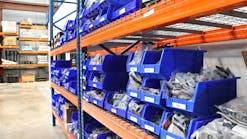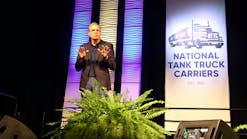Survey finds lack of consensus on funding road improvements
Health care reform was in the driver's seat when Congress returned from its summer recess, but finding a long-term way to pay for America's surface transportation needs was riding shotgun.
According to a new America THINKS survey commissioned by HNTB Corporation, the majority of Americans who say the gas tax is no longer sufficient to properly maintain the country's roads and bridges (57%) is on the rise, up 6% from January 2009.
In fact, the federal Highway Trust Fund would have been broke by October 1, even with an emergency infusion of $7 billion earlier in August, without a continuing resolution. A combination of inflation, changing driving habits, and the increased fuel economy of vehicles has robbed much of the purchasing power from the gas tax, which has been set at the federal level at 18.4 cents per gallon since 1993.
“While the stimulus plan was a start, America needs a long-term vision of its transportation future,” said Paul Yarossi, president of HNTB Holdings Ltd. “Delays only increase costs and the deterioration of our infrastructure. By addressing the problem through workable funding solutions we will be able generate jobs as well as improve the stability of our mobility and our economy. Let's stop talking, and start looking at all the options to find the right combination for America's future.”
“It's time to realize we aren't going to find a free fix,” Yarossi said. And, according to the survey, Americans understand this concept. Even in the midst of a recession, more than two-thirds (67%) of respondents would be willing to spend more money on tolls, taxes, or public transit fares if these funds went toward long-term transportation improvements in their area, such as expanding highway capacity or building high-speed rail.
Yet even when considering the possibility of an improved economy (two consecutive quarters of economic growth), 64% of Americans still wouldn't support a 10-cent increase in the gas tax, which has been endorsed by numerous studies and interest groups, including the US Chamber of Commerce.
Among those willing to spend more on long-term transportation improvements in their area, support for higher gas taxes (36%) fell below more tolls (52%) and public transportation fares (45%). Only higher property, income or sales taxes ranked lower (20%) among traditional infrastructure revenue streams.
While a challenge in the short-term, HNTB's Yarossi sees the glass as half full. “As we continue to move toward more fuel-efficient and alternative-fuel vehicles, it will be imperative that our multiple modes of transportation are supported by multiple forms of funding,” he said.
Americans have always valued paying their own way, and tolling — an old funding mechanism based on the concept that those who use a road or bridge pay for it — appears to have broad support as a way to support surface transportation moving forward.
Eighty-two percent of Americans believe that tolling should be considered in special, project-by-project situations or as a primary source of transportation revenue. Fewer than one in five (18%) feel it should never be used.
Nearly seven in 10 (68%) would support adding high-occupancy toll (HOT) lanes to existing highways to give drivers the option of using these less-congested lanes for a fee that can be adjusted based on the amount of traffic at any given time.
In fact, when asked how to pay for America's roads and bridges in the future, publicly (35%) and privately (20%) run toll facilities, HOT lanes (33%) and other forms of congestion pricing (18%) received more support than an increase in the gas tax (16%) or other new user fees, such as a Vehicle Miles Traveled tax (14%).
Vehicle Miles Traveled is a relatively new concept being proposed as a potential long-term replacement for the gas tax. Many technical questions remain about how and when it might be implemented. Most likely, such a system would use odometer readings or satellite-based technology to measure how much each vehicle is driven and charge the owner accordingly.
However, if VMT were to use a device to record where and when someone drove for the purposes of charging a fee, 80% of Americans would be concerned about their privacy.
“Clearly more study and education is needed,” Yarossi said. “Practically every proposed system has privacy protections built in, and in many cases information about individual drivers would never leave the vehicle.” Currently the University of Iowa Public Policy Center is conducting a study for the US Department of Transportation to determine whether a mileage-based tax is viable. It is scheduled to be completed September 2010.
“What we cannot do is wait,” Yarossi said. “Fluctuating fuel prices and economic turmoil have accelerated changing driving habits.” According to HNTB's latest survey, nearly three in four (73%) Americans are making efforts to conserve gas or drive less often in some way. Of the 77% who don't own a hybrid or electric car but would consider it, an overwhelming 61% would be more likely to get one if they received a tax break or purchasing incentive.
HNTB's America THINKS survey polled a random nationwide sample of 1,000 Americans between July 31 and Aug 7, 2009. It was conducted by Kelton Research, which used an e-mail invitation and online survey. Quotas were set to ensure reliable and accurate representation of the total US population ages 18 and over. The margin of error is +/- 3.1%.








